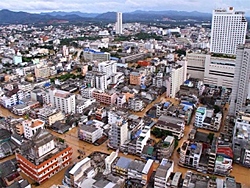
The recent flood crisis in Thailand reached its peak
affect on the Thai economy in November, according to the Bank of Thailand
(BoT) Domestic Economy Department.
Department director Mathee Supapongse said the strong
impact of the flood on the economy had been continuous since October,
particularly on the farming sector both in terms of crop prices and
production. The number of agricultural products dropped 7.2 percent
year-on-year, resulting in an 8.6 percent decrease in farming income.
The industrial sector saw a shrinkage in almost all types
of goods due to a halt in production at several automobile plants, a
shortage of spare parts and transportation problems.
Meanwhile, the Manufacturing Production Index contracted
48.6 percent, especially from the production of hard disk drives, motor
vehicles, and electric appliances.
The private sectorís investment lowered as a result of
production obstacles, and therefore a stoppage in machinery and equipment
investment was seen from the reduced amount of capital goods imports. The
Private Investment Index dropped 1.3 percent year-on-year, also due to
postponed investment, while the Private Consumption Index decreased 1.6
percent in all sectors when compared to the same period last year.
The global economic slowdown is another factor affecting
production as well as imports and exports for many industries.
Imports decreased by 1.9 percent, and 5.7 percent if
excluding gold. Export value stood at US$15.3 billion, a slash of 13.1
percent from motor vehicles, electric appliances, electric circuit boards,
and rice. Inflation rates remained high with headline inflation at 4.19
percent and core inflation at 2.90 percent.
The labor market experienced higher unemployment, but
Mathee viewed this as temporary, for labor would be back in demand once
post-flood rehabilitation was complete.
Regarding the tourism sector, the number of foreign
travelers entering Thailand in November shrank from 17.5 million to 1.2
million year-on-year. The director predicted that the Thai travel industry
would resume as normal within 1-2 months, as most tourists are from Asian
countries and tend to adapt themselves well to the situation.
Meanwhile, Mathee said that the shrinking of the Thai
economy in November more than earlier expected could cause the Bank of
Thailandís estimate of the countryís gross domestic product (GDP) in Q4 and
2011 to lower, but by how much is still to be determined based on Thailandís
economic figures in December.
BoT had previously estimated the countryís 2011 GDP would
rise 1.8 percent.
Nonetheless, Mathee said he expected domestic spending
and consumption would recover in December, owing to the governmentís
assistance measures to stimulate the economy, while he said demand for
automobiles has remained high.
According to the Bank of Thailand, the countryís 2012 economic outlook
for agricultural and industrial sectors shows promise, as normal situations
have returned after the flood crisis. (MCOT)

